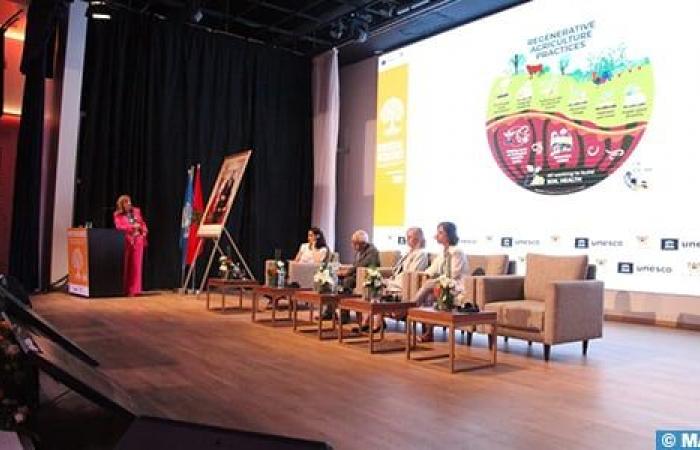Monday, July 1, 2024 at 5:06 PM
Agadir – Experts in environmental issues, meeting on Monday in Agadir, proposed avenues of reflection for sustainable management of soils, ecosystems and biodiversity in the context of climate change.
Taking part in an international conference, organized by the United Nations Educational, Scientific and Cultural Organization (UNESCO) and the National Agency for the Development of Oasis Zones and Argan (ANDZOA) under the theme “Rooted in resilience: Discovering the importance of soil in sustainable development”, these experts explored the ways and strategies to be implemented to combat desertification and improve soil resilience to drought and flooding.
In this sense, the speakers emphasized the nexus between soils, biodiversity, and landscape and water management, highlighting the close correlation between soil preservation and sustainable development.
For Rachid Moussadek, emeritus researcher at the National Institute for Agricultural Research (INRA), preserving healthy soils makes it possible to respond to and remedy the challenges linked to climate change.
“To address the challenges facing the MENA region such as climate change, solutions are now available to promote soil health,” he explained in a presentation titled “Soil Health in the Face of Global Climate Change – Challenges and Opportunities,” proposing tailored solutions in terms of increasing organic matter, safeguarding groundwater, and improving biodiversity.
Mr. Moussadek, also a researcher at the International Center for Agricultural Research in the Dry Areas (ICARDA), in this regard, emphasized certain agroecological practices that need to be promoted and shared, highlighting “the program aimed at promoting conservation agriculture on one million hectares, in addition to other projects dedicated to oasis areas to address climate change in Morocco.”
The Moroccan expert reviewed, in this regard, the initiatives undertaken by Morocco in favor of the African continent in this area, citing the initiative for the Adaptation of African Agriculture (AAA) to climate change, as well as the soil fertility map which was set up by the Ministry of Agriculture, in collaboration with the OCP group and INRA, which was shared with around twenty African countries within the framework of South-South cooperation advocated by HM King Mohammed VI.
These initiatives, he continued, are capable of strengthening the resilience of African countries to climatic hazards and of exchanging good practices in soil management.
Abounding in the same sense, Liette Vasseur, UNESCO Chair on Community Sustainability (Brock University, Canada), affirmed that soil protection necessarily involves awareness-raising and education, but also the promotion of research, stressing the importance of involving local communities more and making them aware of the issue of managing their soils.
Ms. Vasseur noted that the stakes in Africa are high, particularly in terms of reduced rainfall and its impact on soil health and vegetation cover, which plays an important role in combating erosion.
For her part, Helena Freitas, professor of biodiversity and ecology at the University of Coimbra in Portugal, stressed the importance of ensuring the health of soils and preventing their degradation, in order to preserve living ecosystems.
Ms. Freitas, who also holds the UNESCO Chair in Biodiversity, called for “as strong an initiative as possible” on soil preservation and rehabilitation “because the world needs it.” “We need soil to have productive and living ecosystems, and to prevent water loss, especially in countries facing drought,” she continued.
For her part, Natalia Rodriguez Eugenio, land and water officer at the Food and Agriculture Organization (FAO), said there are different ways to protect soils, including raising awareness among all of society, from children to farmers and policy makers, about the importance of soils.
Once this knowledge and understanding have been acquired, action must be directed towards protecting soils through agricultural practices that do not degrade them, and through legislation that encourages these good practices, she noted, stressing the need to promote the consumption of products from sustainable production methods.
Soil protection must be a comprehensive and holistic action by all stakeholders, she added.






